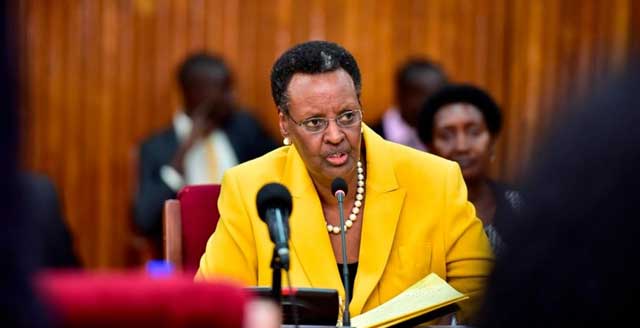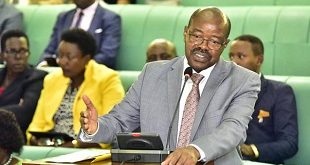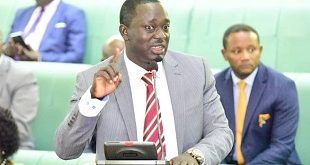
Kampala, Uganda | THE INDEPENDENT | There is a lot of uncertainty over the implementation of the new lower secondary school curriculum with less than ten days to the formal kick off of senior 1 classes.
Early this week, Parliament halted the implementation of the new lower secondary curriculum whose rollout had begun on grounds that it was being rushed without adequate consultations of all stakeholders and harmonisation on some key elements among other factors.
Parliament’s decision and the heated debate around the curriculum have generated public anxiety. Now, the Education and Sports Ministry notes that the matter has been taken back to the cabinet for a discussion and guidance.
The Education and Sports Minister, Janet Kataaha Museveni told journalists shortly after the release of the Uganda Business and Technical Examination Board-UBTEB results on Friday, that after the cabinet discussion, they will have to sort out their next cause of action with parliament.
Mrs. Museveni pleaded with legislators to support the roll-out and implementation of the new curriculum since the ministry has confidence that it is for the good and betterment of learners in the country.
The Education Ministry Permanent Secretary, Alex Kakooza, who punched holes in the over 26 queries raised by MPs, notes that they were surprised to see that some legislators raised issues mostly based on heresy thus making a wrong decision at the expense of the country.
Kakooza notes that the ministry went through every step until when the curriculum was approved by cabinet. He hopes that the guidance from cabinet will come before the learners report to school.
Although MPs halted the implementations of the curriculum, according to the Education Ministry, the Education Committee of Parliament was consulted, updated and knew what was happening to the extent that they recommended the skipping of a pilot study of the curriculum in question.
“During the August 28, 2018 meeting, NCDC presented the ministry’s plan of piloting the curriculum in 20 schools. The advice from honorable members was that since the design of the curriculum had reverted to subjects from the earlier design of learning areas then there was no need to stretch the already thin budget on piloting,” said Kakooza.
Another area of contention has been the mode of assessment in the new curriculum, with the MPs asking the Ministry to explain the three forms of assessment including formative assessment awarded by teachers, and other two summative assessments one conducted by Uganda National Examination Board-UNEB and another by Directorate of Industrial Training-DIT.
“The formative assessment score will form part of the total learner score at the end of the cycle with 20 percent and the 80 percent will be for summative,” the Permanent Secretary noted. Adding that, “the new curriculum allows interested learners to be subjected to DIT examinations which will assess the world of work competencies (skill development).”
He says that DIT examinations in subjects like; Entrepreneurship, Agriculture, ICT, Performing Arts, Art And Design, Physical Education And Food And Nutrition will be sat while in S.3 and then UNEB will assess after the completion of the cycle in S.4.
The National Curriculum Development Center Director Dr. Grace Birungi Baguma explains the decision to include skills development was made following a labor market survey, which showed that learners lacked needed skills at the end of the education cycle.
With this arrangement, a learner will get out with two certificates that are the Uganda Certificate of Education and level 1 competency certificate from Uganda Vocational Qualification Framework –UVQF. For both certificates, the learner will have a chance of progressing to the next level of education.
Baguma stresses that in the past ten years, NCDC has been benching marking to borrow best practices that could work for Uganda. Some of the countries where the benchmarking was done include Ghana, Singapore, Turkey, Kenya and Finland in addition to consulting different stakeholders including the head teachers association, vice-chancellors forum, and representatives from national teacher’s colleges among others.
During a recent interview, Filbert Baguma, the Secretary-General of Uganda National Teacher Union challenged the Ministry to bring a list of teachers who were consulted. He noted that UNATU had been sidelined and relegated to the role of observer in the entire process.
In 1989, Professor George William Ssenteza Kajubi chaired an education commission, which conducted a needs assessment of the entire education system culminating in the 1992 Government White Paper on education. The white paper recommended among other things a review of the curriculum across the board.
However, the review delayed up to 2005 beginning with the early childhood development curriculum, lower primary in 2007 and upper primary in 2013. Available information indicates that the process of reviewing the lower secondary curriculum begun way back in 2007 starting with a study on a report on the curriculum itself, assessment and examination.
The report revealed that the curriculum was not in line with international benchmarks, emphasized book learning and academic achievements for entry into the next level than mastery of competencies and skills.
In 2016, work on lower secondary curriculum begun. The said curriculum was designed to reduce learners’ load by merging overlapping and repeated content and dropping irrelevant areas. The new curriculum also emphasized competence-based learning as opposed to cramming.
According to The United Nations Educational, Scientific and Cultural Organization-UNESCO, a curriculum should be reviewed every after five years due to the rapid global changes to address the quality of education achieved by learners and how effective learners use learning for their personal social, physical, cognitive and psychological development.
******
URN
 The Independent Uganda: You get the Truth we Pay the Price
The Independent Uganda: You get the Truth we Pay the Price


